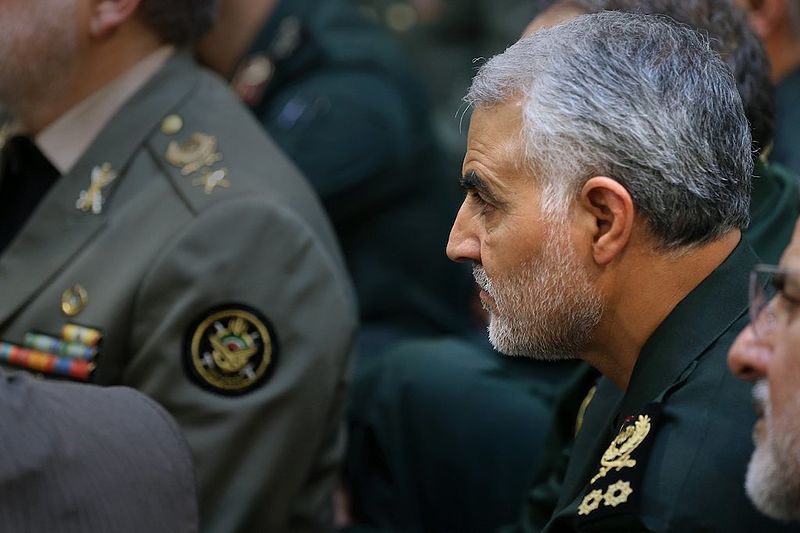Europe is between a rock and a hard place trying to balance its alliance with the US and its interests in Iran after last week's strike that killed Qasem Soleimani. Instead of calling for restraint, the EU must become a mediator to avoid conflict and protect its interests.
An assassination or an anti-terror operation? A martyr or a killer? War or no war? The United States’ strike in Iraq last week which killed Qasem Soleimani, the leader of Iran’s Quds Force in Iraq generated more questions than answers. However, one ramification of the strike could not be clearer. The European Union is now forced to pick sides in the developing conflict, with either choice presenting troubling externalities.
On one hand, should the EU support the US, it runs the risk of becoming a target for Iranian retribution and losing recently built-up goodwill with Iran. On the other hand, should the EU try to mitigate Iranian instigation, it will further strain the EU-US relationship while also falling prey to increased Iranian demands to prove its independence. But that is only if the EU remains on the sidelines.
Simply calling for restraint is a losing position for the EU It needs to become a mediator not only to achieve de-escalation but also increase the chances of protecting EU citizens and interests in the region.
Why was the EU dragged into this?
Even though the European-American alliance is at its lowest point ever, its historical significance remains. It is impossible for anyone to separate Europe and America, especially Iran. Although this is not the first time that the EU and the US have differed on Iranian policy, they are still robust allies. The EU is not responsible for the strike, but its proximity to the US may be enough to condemn it by association in Iran’s view.
This threat was immediately acknowledged by Europe. Not only was the reaction by press and analysts from around the world much more worried about escalation, but so too was the initial reaction by European countries. France and the United Kingdom both openly criticised the strike, while Italian politicians opposed it. Whether it wants to or not, Europe cannot hope to ignore the fallout of this strike because its past involvement as a buffer between the US and Iran left it in the middle of this geopolitical tinderbox.
What are the consequences if the EU stays with the US?
If Europe remains in the US camp it will face increased risk against its citizens and interests. France took no time to issue a warning to its citizens in Iran, while the Netherlands instructed its citizens to leave Iraq altogether. Although Iran has vowed to retaliate against the US, that retaliation could also have collateral and intentional damage against US allies, Europe included.
In less kinetic considerations, the work that Europe has done to salvage the Iranian nuclear deal would dissolve further if Europe is perceived by Iran to be backing American aggression. In that scenario, not only would Iran’s nuclear program resume in earnest, but economic ties that EU.member states have been trying to build with Iran like France’s oil-based bailout or the UK’s skirting of US sanctions on Iran are likely to whither.
What will be the consequences if the EU tries to save face with Iran?
But what if the EU instead distanced itself from the strike? Member states have tried to walk this tightrope, signalling their displeasure and unease with the situation. In doing so, they would take another step away from the US, and continue to degrade the EU-US relationship further. Considering how personally involved President Trump was with the strike, countering his decision could loom on Europe for some time.
Unfortunately, trying to maintain goodwill from Iran to save the nuclear deal or European business interests will not come cheap. Iran would likely ask of European nations for something tangible in addition to breaking with the US in order to prove their intention to do so beyond merely stating condemnation.
A Third Way: Mediation
The only way for the EU to avoid this geopolitical zugzwang would be for it take on a mediator role immediately. The EU has a large mediation apparatus, certainly larger than its member states, and can act as a single voice as opposed to many separate ones. Also, given that this nascent conflict has the potential to encapsulate the globe, not just the region, it will require a substantial mediating party, not only a handful of countries. Lastly, other parties not friendly to European interests have become peacemakers in the hopes of benefiting from their actions, namely Russia in Afghanistan and China in sub-Saharan Africa. It would not be surprising if either party did the same in Iran.
It remains to be seen how the next phase of this conflict will unfold, but the likelihood of kinetic escalation rises each day. Much has been said about Europe’s inability to affect US-Iran relations, but this latest flare can be its opportunity to de-escalate tensions and, hopefully, help avoid war in the region.
Alessandro Regio


